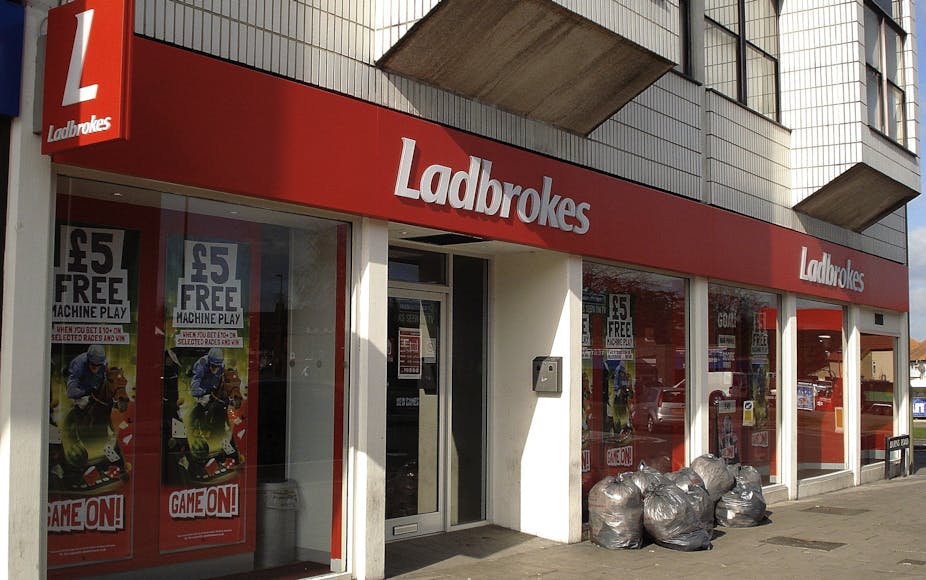Some of the biggest players in the gambling industry are joining forces in a move that is being marketed as “promoting responsible gambling standards”. William Hill, Ladbrokes, Coral and Paddy Power have set up their own industry watchdog, The Senet Group.
As of October 1 they have withdrawn advertising for gambling machines from betting shop windows and allocated 20% of display space for responsible gambling messages. They have also introduced a voluntary TV advertising ban on free bets and free money offers before 9pm. From next year The Senet Group will fund an educational advertising campaign on problem gambling, while its members will introduce prominent messages about responsible gambling into their TV advertising.
The measures go beyond what is currently required by the government or the regulator, the Gambling Commission. However, the situation is under review and it is likely that statutory requirements could be imposed soon as a response to public concerns and political pressure over what’s seen as the rapid increase of gambling in society.
Bet bombardment
A recent Ofcom report found that advertisements for gambling on television have increased by 600% since the previous restrictions were lifted with the 2005 Gambling Act, and 1.39m gambling adverts are now aired annually in the UK. Adults view approximately 630 each year and under-16s are exposed to an average of 211. In addition, high-stakes machines in betting shops – commonly known as fixed-odds betting terminals (FOBTs) – have recently been the focus of critical media attention, as well as national campaigns and political debate.

The highly lucrative machines, which make some £1.5bn profits for bookmakers, have been linked to gambling problems and debt, particularly in low-income neighbourhoods. This has led to talk both in England and Scotland of government intervention to reduce their top stakes, as well as powers for local authorities to ban the machines altogether.
All of this has generated considerable negative publicity for the industry. This mounting pressure is the context in which betting companies have been taking the initiative in an attempt to stave off further scrutiny and possible regulation. The Senet Group declaration comes shortly behind a voluntary code of conduct, which was rolled out for players of FOBTs by the Association of British Bookmakers in March 2014.
Lessons from booze and burgers
Such measures as self-regulation and voluntary codes of conduct are often invoked at times like this. Both the alcohol and the food industries have pledged to regulate their conduct – particularly around marketing – and emphasised their commitment to social responsibility, mainly by directing attention towards the “responsible drinking” and “responsible diet” of individuals, rather than on the broader marketing and production of products that could damage their health.

The Senet Group is reminiscent of the alcohol trade body the Portman Group, whose aims to promote social responsibility in alcohol consumption and marketing have been largely discredited by its close association with the industry. Research has shown that self-regulation by the alcohol and food industries is not effective in protecting vulnerable populations, particularly young people, and also that industry compliance with voluntary measures is itself often low.
Indeed, the credibility of the gambling industry’s recent posturing has already been called into question with the recent Advertising Standards Authority (ASA) ruling to ban two of Ladbrokes’ billboard advertisements for betting. The ASA deemed that the ads, which had received 98 complaints, condoned an “irresponsible attitude to gambling”. The decision sits awkwardly alongside the claims for responsible self-regulation, and can only undermine public confidence in the exercise as a whole.
As for the voluntary measures …
Aside from these broad issues are a number of practical problems around the Senet Group’s voluntary measures. So far only four companies have signed up, not including the Tote, which along with Ladbrokes, William Hill and Coral makes up the “big four”. Any code of practice can only work if all industry players are committed to it, but there is no guarantee that this will happen.

Beyond this, who ensures the watchdog is independent? Who will monitor and ensure compliance? Sanctions -– described as the ability to “name and shame” and impose (unspecified) fines – appear rather vague and are unlikely to be tough enough to bring recalcitrant members into line. And, importantly, the new measures only deal with conventional terrestrial advertising, but do not address online activity at a time when many of the leading gambling operators are increasingly moving to mobile marketing through smartphones and tablets.
The fact is that some forms of consumption are simply more risky than others, and the interests of the shareholders of powerful corporations are not the same as those of individual consumers. In these cases, voluntary industry codes and self-regulation are not robust enough to ensure that the well-being of the public is protected.
The only way to ensure that all sectors of the industry commit to responsible practice is to implement statutory requirements for them to do so. This should be enacted through legislation, overseen by the regulator, and monitored by independent research.

